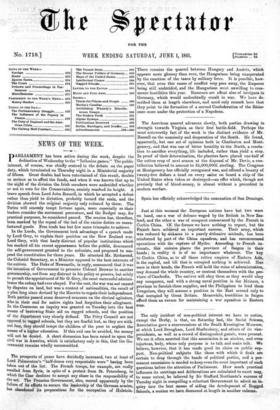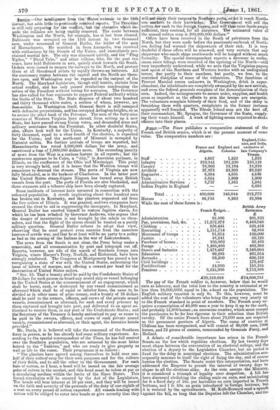iseriss.-Our isttelligence. from the States extends to the 18th instant,
but adds little to previously received reports. The President is still only preparing for the conflict, but the obstacles witich im- pede the collision are being rapidly removed. The route between Washington and the North, for example, has at last been cleared. Baltimore was occupied on the 15th instant by two thousand men, under command of General Butler, the leader of the men of Massachusets. He marched in from Annapolis, was received
with enthusiasm by the friends of the Union, and immediately pro- claimed martial law. The city was disarmed quietly, and the "Plug Uglies," "Blood Tubs," and other villains, who, for the past ten years, have held Baltimore in awe, quietly slunk towards the South. Orders were issued to reopen the railways to the North, and protect them at all threatened points by rapidly thrown-up batteries. All the customary routes between the capital and the North are there- fore open, and Washington may be regarded as the outpost of the North. The Maryland legislature, though still hostile, shrinks from actual conflict, and has only passed resolutions condemning the action of the President without voting for secession. The Governor has also called for four regiments to support Federal authority within the limits of the State. The State disposes of about two hundred and thirty thousand white males, a section of whom, however, are free-soilers. In Washington itself, General Scott is still occupied with defensive preparations, and has occupied Arlington heights, so as to secure the other bank of the Potomac. The men of the forty-nine counties of Western Virginia have shrunk from setting up a new State, but have passed strong Union votes, and demanded arms and military assistance from the President. In other doubtful States, also, affairs look well for the Union. In Kentucky, a majority of forty thousand, equal to a clear fourth of the electors, is expected for the Union; and the north-east of Missouri is occupied by Unionist militia. No farther arrivals of troops are reported, but Massachusetts has voted 3,000,900 dollars for the army, and sanctioned a loan of 7,000,000 dollars more. The exceeding paucity of news from the West is a curious feature in all reports ; but the rendezvous appears to be Cairo, a "city," in American parlance, in Illinois, on the confluence of the Ohio and Mississippi. This point is very strongly held, and it is hence that the Western troops will commence to descend the stream. The ports of Virginia are now fully blockaded, as is the harbour of Charleston. In the latter port the United States steam-frigate Niagara has turned away British vessels from the port. The ports of Florida are also blockaded, and three steamers and a tobacco ship have been already captured.
Some incidents of interest have occurred in connection with the coloured population. A revolt implicating about five hundred men has broken out in Kentucky, and the planters requested aid from the free soilers of Illinois. It was granted, and two companies have crossed the river to aid in suppressing the insurgents. In Maryland, General Butler has exerted himself to restore fugitive slaves, for which he has been rebuked by Governor Andrews, who argues that the danger of insurrection is one brought by the rebels on them- selves, and that the flight of the slaves should be treated as .a purely military question. General Butler refuses to adopt that view, observing that he must protect even enemies from the nameless horrors of servile war, and that he at least will be no party to a policy as bad as the arming of the Indians in the war of Independence.
The news from the South is not clear, the Press being under a censorship, and all communication by post and telegraph cut off. Reports, however, are rife of the march of Southern troops into Virginia, where Harper's Ferry, Norfolk, and Richmond, have been strongly reinforced. The Congress at Montomery has passed a law recognizing a state of -war with the United States, authorizing the issue of letters of marque, and offering a reward per head for the destruction of United States sailors.
" Sec. 10. That a bounty shall be paid by the -Confederate States of 20 dollars for each person on board any armed ship or vessel belonging to the United States at the commencement of an engagement, which shall be burnt, sunk, or destroyed by any vessel commissioned as aforesaid which shall be of equal or inferior force, the same to be divided as in other cases of prize money, and a bounty of 25 dollars shall be paid to the owners, officers, and crews of the private armed vessels, commissioned as aforesaid, for each and every prisoner by them captured and brought into port, and delivered to an agent au- thorized to receive them, in any port of the Confederate States; and the Secretary of the Treasury is hereby authorized to pay or cause to be paid to the owners, officers, and crews of such private armed vessels, commissioned as aforesaid, or their agent, the bounties herein provided." Mr. Davis, it is believed will take the command of the Southern force in person, as he has already had some military experience. Ac- cording to the special correspondent of the Times, he has full control over the Southern population, who are actuated by the most bitter hatred to the "Yankees," and who are ready to give property as well as life to the cause. Their programme is as follows :
" The planters have agreed among, themselves to hold over one- half of their cotton' crop for their own purposes and for the culture of their fields, and to sell the other to the Government For each hale of cotton, as I hear, a bond will be issued on the fair average price of cotton in the market, and this bond must be taken at par as a circulating medium within the limits of the Slave States. This forced circulation will be secured by the Act of the Legislature. The bonds will bear interest at 10 per cent., and they will be issued' on the faith and security of the proceeds of the duty of one-eighth of a cent on every pound of cotton exported. All vessels loading with cotton will be obliged to enter into bonds or give security that they
will not carry their cargoes to Northern ports, lar let it reach North- ern markets to their knowledge. The Goverment will sell the cotton for cash to the foreign buyers, and will thus raise funds amply sufficient, they contend, for all purposes. The estimated value of the annual cotton crop is 200,000,000 dollars."
Offers have been received in the South of privateers from the North, but they were made before the passionate outbreak of North- ern feeling had warned the shipowners of their risk. It is very doubtful if these offers will be renewed, and very certain that any shipowner who sends ships southwards will be hanged without much formality. The special correspondent reports a decrease in enthu- siasm since tidings were received of the uprising of the North-still very imperfectly understood, while we note that the Virginian papers now speak of the Northern and Western hordes with an undisguised terror, due partly to their numbers, but partly, we fear, to the wretched discipline of some of the volunteers. The functions of Provost Marshal seems unknown in Washington, drink is super- abundant, the inhabitants are completely.swamped by the new arrivals, and even the federal generals complain of the demoralization of their men. Indeed, the arrangements to secure order, supplies, and health seem as imperfect as the efforts to arm the troops are energetic. The volunteers complain bitterly of their food, and of the delay in furnishing them with quarters, complaints in the former instance apparently well founded. The Rhode Island men are the best off, their commandant, Mr. Sprague, the Governor of the State,supply- ing their wants himself. A week of fighting seems required to shake officers into their places.































 Previous page
Previous page